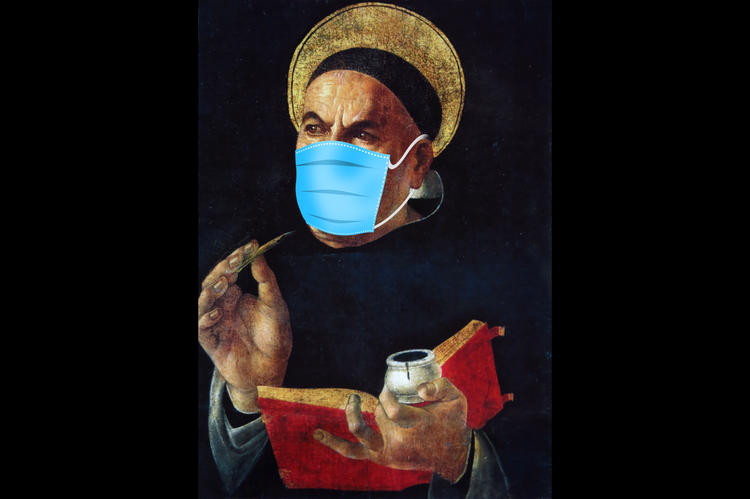What is the proper spiritual response to the coronavirus pandemic? Although many Catholics seek to use this period as “a time of renewal,” as one priest put it, a vocal minority are approaching the pandemic with words more suited to culture warriors than to spiritual warfare. Any Catholic who has spent time on social media has probably encountered members of the faithful who are deeply suspicious of public health precautions. They will admit that people who are particularly vulnerable to Covid-19 are worthy of special protection. But they resist as overzealous government intrusion any precaution that might impede upon their personal right to celebrate the sacraments.
This mentality of suspicion leads some Catholics to deride those who observe public health precautions as cowards who have capitulated to a spirit of fear. To support their uncharitable attacks, they point to Jesus’ teaching (as in Mt 16:26) that the soul is more valuable than the body. Some even go so far as to assert that Catholics who refrain from attending public liturgies out of fear of Covid-19 are lukewarm in their faith.
How, then, to respond to those who claim that Catholics who heed health guidance are giving themselves over to an un-Catholic “slavery...by their fear of death” (Heb 2:15)? I suggest consulting St. Thomas Aquinas. In his Summa Theologiae, St. Thomas offers profound observations on fear and the virtue that remedies it, fortitude. Some points he makes are especially relevant to today’s debates.
St. Thomas offers profound observations on fear and the virtue that remedies it, fortitude. Some points he makes are especially relevant to today’s debates.
There is no sin in fearing the needless loss of one’s life or health.A sin is by definition an unreasonable act. But, Aquinas says, “reason dictates that we should shun the evils that we cannot withstand, and the endurance of which profits us nothing. Hence there is no sin in fearing them.”
The answer to fear is not defiance. It is fortitude. Our fear should lead us to ask God for an increase in the cardinal virtue of fortitude. But practicing fortitude does not mean tempting God by being reckless. Rather, Aquinas says, fortitude strengthens us by “curbing fear and moderating daring.”
The words of the Serenity Prayer offer an example of fortitude in action: “God, grant me the serenity to accept the things I cannot change, courage to change the things I can and wisdom to know the difference.” Although the “wisdom to know the difference” comes from the virtue of prudence, which directs the other cardinal virtues, the “serenity to accept the things I cannot change” and “courage to change the things I can” are both aspects of fortitude.
The Angelic Doctor offers a searing response to those who might protest that the Christian way is to “man up.”
And this brings us to our final point from Aquinas: The principal act of the virtue of fortitude is not aggression. It is endurance. Sometimes it is necessary to attack our fears head-on. A priest I know faces his fear of Covid-19 so that, taking every reasonable precaution, he may bring the sacraments to patients in hospitals who are dying of the virus.
Aquinas grants there are times when one has no other option than “aggression”—taking bold action against that which causes fear. Even so, he takes care to emphasize that “the principal act of fortitude is endurance, that is to stand immovable in the midst of dangers rather than to attack them.”
But St. Thomas does not stop there. The Angelic Doctor, who lived at a time when Europe had 19,000 lazarettos—isolation hospitals for victims of leprosy or plague—offers a searing response to those who might protest that the Christian way is to “man up.” He stresses that endurance is not merely more proper to fortitude than is aggression; it is also more manly, in the genuine sense of being more human, than “manning up.”
St. Thomas would say that those who urge Catholics to push the boundaries of appropriate precautions are promoting a spirit of recklessness that is the antithesis of authentic virtue.
“Endurance is more difficult than aggression,” Aquinas explains. This makes sense if we consider that when we fight, we attack because we believe we have some power over our opponent. But when we endure, we do so because we believe that our opponent is stronger than we are; “and it is more difficult,” St. Thomas notes, “to contend with a stronger than with a weaker.”
We need, therefore, to ask the Lord for an increase in fortitude so we may have the strength to endure temporary inconveniences, whether great or small, “and persevere in running the race that lies before us” (Heb 12:1). The sacrifices we make in limiting our sacramental participation will not starve us of grace, as the culture warriors claim. God is not bound by the sacraments. “Give,” Jesus says; give to God and neighbor, “and gifts will be given to you” (Lk 6:38).
St. Thomas would say that those who urge Catholics to push the boundaries of appropriate precautions are promoting a spirit of recklessness that is the antithesis of authentic virtue. If we are to be reasonable about the threat from Covid-19 threat, we must recognize that we can survive the virus only if we meet it on its terms, not ours.
In Matthew 25, Jesus says that we will be judged on the care we provide to others. When loving our neighbor means forgoing a normal ecclesial life—as Catholics have had to do during countless disasters, plagues and persecutions—we can trust that the Lord will continue to feed us with his Spirit until the time comes when we can celebrate together again.








